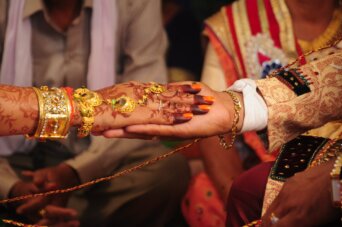- About
- Topics
- Story
- In-Depth
- Picks
- Opinion
- News
- Donate
- Signup for our newsletterOur Editors' Best Picks.Send
Read, Debate: Engage.
| topic: | Discrimination |
|---|---|
| located: | India |
| editor: | Tish Sanghera |
A typical Indian wedding procession in North India looks a little like this: the groom’s relatives dance exuberantly while dressed in all their finery, the latest bollywood hits are played by a marching band and provide the soundtrack, and most importantly, the soon-to-be-wed groom, sitting atop a white stallion, leads the throng on the way to meet his bride.
But not everyone in Indian society is allowed to celebrate their nuptials in this way. According to India’s persistent and rigid caste structures, in many communities a groom’s right to ride a horse to his wedding is still reserved only for those in the highest caste groups.
Indeed the sight of a low-caste, or Dalit, groom on a horse can often lead to conflict. Recently, in the central Indian state of Madhya Pradesh, upper caste groups hurled abuse and pelted stones at a groom’s house on his wedding day - all for simply daring to sit atop a horse. The violence mirrors other reported crimes for perceived ‘caste violations,’ such as Dalits daring to sport a mustache or participate in certain folk dances.
Such inter-caste conflicts over riding a horse represent a deeper societal struggle - that of the backlash against Dalits’ slowly improving socio-economic status due to affirmative action programmes and better access to education. Increasingly, upper caste groups are becoming anxious of the narrowing of wealth and education gaps, as well as the rising competition for jobs in a poorly performing economy. According to data from India’s National Crimes Record Bureau (NCRB), crimes against the lowest castes groups (Scheduled Castes and Scheduled Tribes) increased by over 9 percent in 2021)
In a bid to help improve social justice for Dalits, officials in Rajasthan’s Bundi district launched ‘Operation Samanta’ or Operation Equality. Under the initiative, they have been working to help grooms ride horses to their weddings without fear of retaliation from upper castes in the village. “We have started this initiative as we have seen that in many places, people are not aware about their rights. They think that some wedding customs, like the groom riding a mare is the right of the upper class people only and, so, they should not follow these rites,” SP Yadav, a local official, stated.
While the project may seem to be tackling a minor issue in the wider spectrum of caste injustices suffered by Dalits on a daily basis, the officials hope the highly symbolic and visible nature of Dalit grooms on horseback will help break societal norms that allow low-caste prejudce to exist. “We have to change this [prejudiced] thinking because our constitution provides equal law to each and every citizen of India and everyone has the same right to perform their rituals,” added Yadav.
Photo by Jayesh Jalodara

